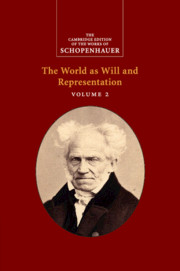Chapter 22 - Objective View of the Intellect
Published online by Cambridge University Press: 30 June 2022
Summary
There are two fundamentally different ways of investigating the intellect, based on two different standpoints; but however opposed this difference makes them, they must nonetheless be brought into agreement. – The one is the subjective view which, starting from the inside and taking consciousness as given, shows us the mechanism through which the world presents itself in consciousness, and how it constructs itself in consciousness from materials provided by the senses and the understanding. Locke must be regarded as the originator of this mode of investigation: Kant perfected it to an incomparable extent, and our First Book, together with its supplements, is also dedicated to this view.
The opposite way of investigating the intellect is the objective way, which starts from the outside and does not take one's own consciousness for its object but instead takes the beings that are given in outer experience and that are conscious of themselves and the world; it examines the relationship their intellect has to their other qualities, what makes their intellect possible, what makes it necessary, and what it does for them. The standpoint of this type of investigation is empirical: it takes the world and the animal beings present in it as simply given, since it proceeds from these. It is therefore primarily zoological, anatomical, physiological, and only becomes philosophical in connection with the first type of investigation and the higher standpoint this has achieved. We are indebted to (mostly French) zootomists and physiologists for the only groundwork provided so far for this investigation. Cabanis in particular should be cited in this regard, since his superb work, The Relations of the Physical to the Moral was a pioneering text in establishing the physiological perspective. The famous Bichat was working at the same time, although his subject was much broader. Even Gall deserves to be mentioned here, even though his principal goal went astray. Ignorance and prejudice have levelled the charge of materialism against this mode of investigation, because, in sticking purely to experience, it does not recognize the immaterial substance, the soul.
- Type
- Chapter
- Information
- Schopenhauer: The World as Will and Representation , pp. 285 - 304Publisher: Cambridge University PressPrint publication year: 2018

